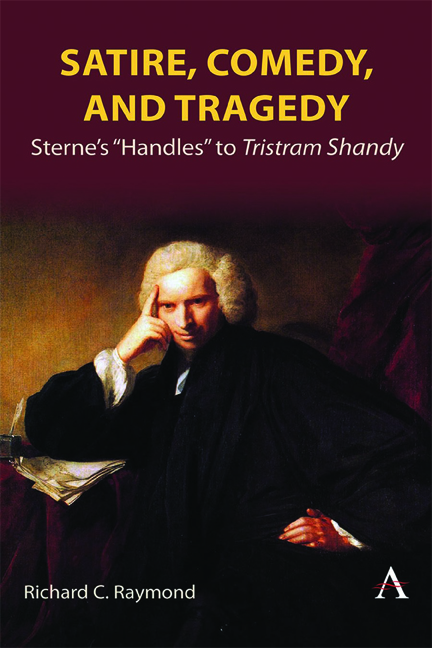Book contents
- Frontmatter
- Contents
- Preface
- 1 Walter, Toby, Tristram, and the Reader: Sterne’s Revision of “Dullness”
- 2 The Yorick Standard, Walter’s Benevolent Dullness, and Tristram’s Friends: The Plot of Satire in Tristram Shandy
- 3 “True Shandeism”: The Unhappy Comic Action in Tristram Shandy
- 4 Isolation and Death: The Tragic Undertones of Shandean Benevolent Dullness
- 5 Benevolent Dullness, Ambiguity, and the Reader: Modal Complexity and the Plots of Tristram Shandy
- 6 Laurence Sterne’s Letters
- 7 The Shandean Sermons of Parson Sterne
- 8 Parson Yorick in A Sentimental Journey and in A Continuation of Bramine’s Journal
- 9 The International Perspective on Tristram Shandy and the Argument
- References
- Index
2 - The Yorick Standard, Walter’s Benevolent Dullness, and Tristram’s Friends: The Plot of Satire in Tristram Shandy
Published online by Cambridge University Press: 01 March 2024
- Frontmatter
- Contents
- Preface
- 1 Walter, Toby, Tristram, and the Reader: Sterne’s Revision of “Dullness”
- 2 The Yorick Standard, Walter’s Benevolent Dullness, and Tristram’s Friends: The Plot of Satire in Tristram Shandy
- 3 “True Shandeism”: The Unhappy Comic Action in Tristram Shandy
- 4 Isolation and Death: The Tragic Undertones of Shandean Benevolent Dullness
- 5 Benevolent Dullness, Ambiguity, and the Reader: Modal Complexity and the Plots of Tristram Shandy
- 6 Laurence Sterne’s Letters
- 7 The Shandean Sermons of Parson Sterne
- 8 Parson Yorick in A Sentimental Journey and in A Continuation of Bramine’s Journal
- 9 The International Perspective on Tristram Shandy and the Argument
- References
- Index
Summary
In analyzing the plot of satire in Tristram Shandy, I will first join Melvyn New and others in affirming that Sterne has set up good-natured Parson Yorick as his model of the humble but active life of benevolence, his Christian satiric standard, which exposes by contrast the self-defeating folly of dullness. But I will depart from New and John Stedmond by demonstrating the paradoxical blend of dullness and benevolence in the Shandean world. Focusing primarily on Tristram's father, Walter, I will show that Shandean self-deceptions flow from generosity as well as from self-importance. I will argue, too, that Sterne created this ambiguous but laughter-provoking fictional world not to make dullness seem harmless but to draw readers into “friendship” with those—the Shandys—who lack the brutal brand of dullness that buried Yorick, thereby luring readers toward the standard of humble benevolence that most will never fully attain. To emphasize the elusive challenge of Yorick's life, I will finally illustrate how Sterne uses Tristram to mock the dullness in readers that he fails to see in himself.
Dullness and Distortion of Reality
The plot of satire, says Alvin Kernan, relates events in no causal, linear sequence. Rather, the ironic, apparently disjunctive plot relates the actions of the self-deceived in conflict with the actions of the real world. Motivated by pride, by the conviction that they may exceed limitations that define mortals, the dull ignore “what is and is not possible for man” and, therefore, secure perpetual self-defeat and “build,” ultimately, a world without form, a wasteland swarmed by a mindless mob (Kernan 1965, 102, 14). Such a plot, notes Kernan, illustrates Northrop Frye's description of the “mythos of winter,” one of the four “mythoi or generic plots,” the mythos that portrays the energetic “creation” of chaos, of a “world that desire rejects” (Kernan 1965, 183, 14).
This triumph of chaos results, Kernan writes, from a “multitude of smaller movements” of dullness, which he categorizes as confusing reality, magnifying reality, and diminishing reality. When dull people use language, explains Kernan, they produce confusion rather than clarity because they intend to display their verbal wit, not to share their observations on reality (Kernan 1965, 30).
- Type
- Chapter
- Information
- Satire, Comedy and TragedySterne's 'Handles' to <i>Tristram Shandy</i>, pp. 29 - 58Publisher: Anthem PressPrint publication year: 2023

